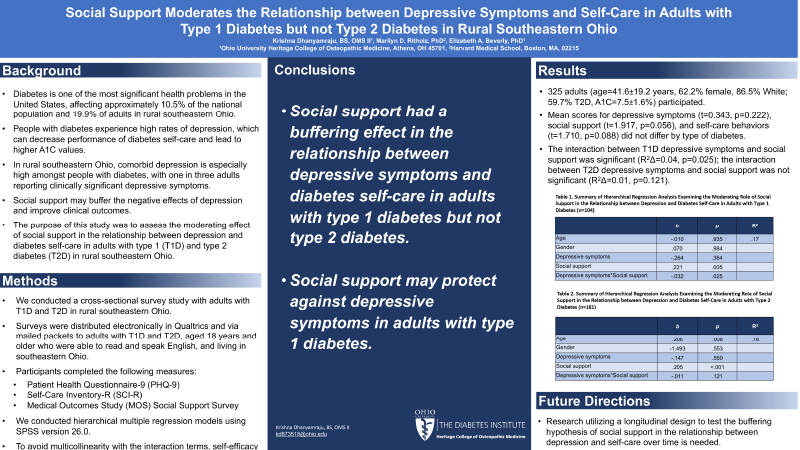
Leading through advocacy, education, and relationships
Social Support Moderates the Relationship between Depressive Symptoms and Self-Care in Adults with Type 1 Diabetes but not Type 2 Diabetes in Rural Southeastern Ohio
Category: 2020
Author: Krishna Dhanyamraju
Institution Affiliation: Ohio University Heritage College of Osteopathic Medicine
Background: In rural southeastern Ohio, the prevalence of diabetes is 19.9%. Higher rates of diabetes are associated with poverty, food insecurity, unemployment, and depression. Research that focuses on resources and facilitators that counteract the negative effects of depression is necessary Objective: Social support may buffer the negative effects of depression on diabetes outcomes. The purpose of this study was to assess the moderating role of social support in the relationship between depression and self-care in adults with type 1 (T1D) and type 2 (T2D) diabetes. Methods: Participants completed the Patient Health Questionnaire-9, the Medical Outcomes Study Social Support Survey, and the Self-Care Inventory-Revised. We conducted hierarchical multiple regression models using SPSS version 26.0. Results: A total of 325 adults (age=41.6±19.2 years, 62.2% female, 86.5% white; 59.7% T2D, A1C=7.5±1.6%; duration=12.4±9.6 years) participated. Mean scores for depressive symptoms (t=0.343, p=0.222), self-care behaviors (t=1.710, p=0.088), and total social support (t=1.917, p=0.056) did not differ by type of diabetes. The hierarchical linear regression models tested whether total social support moderated the relationship between depressive symptoms and self-care in participants with T1D and T2D, controlling for age and gender. The interaction between T1D depressive symptoms and total social support was significant (R2Δ=0.04, p=0.025), suggesting that social support moderated or buffered the relationship between depressive symptoms and self-care. In the T2D, the interaction between depressive symptoms and social support was not significant (R2Δ=0.01, p=0.121), revealing no moderation or buffering effect between social support and depressive symptoms on self-care.Conclusions: Findings suggest social support buffered the effects of depressive symptoms in adults with T1D but not T2D. Additional research is needed to confirm these findings.
Watch Video
 Phone: 567-712-0697
Phone: 567-712-0697
